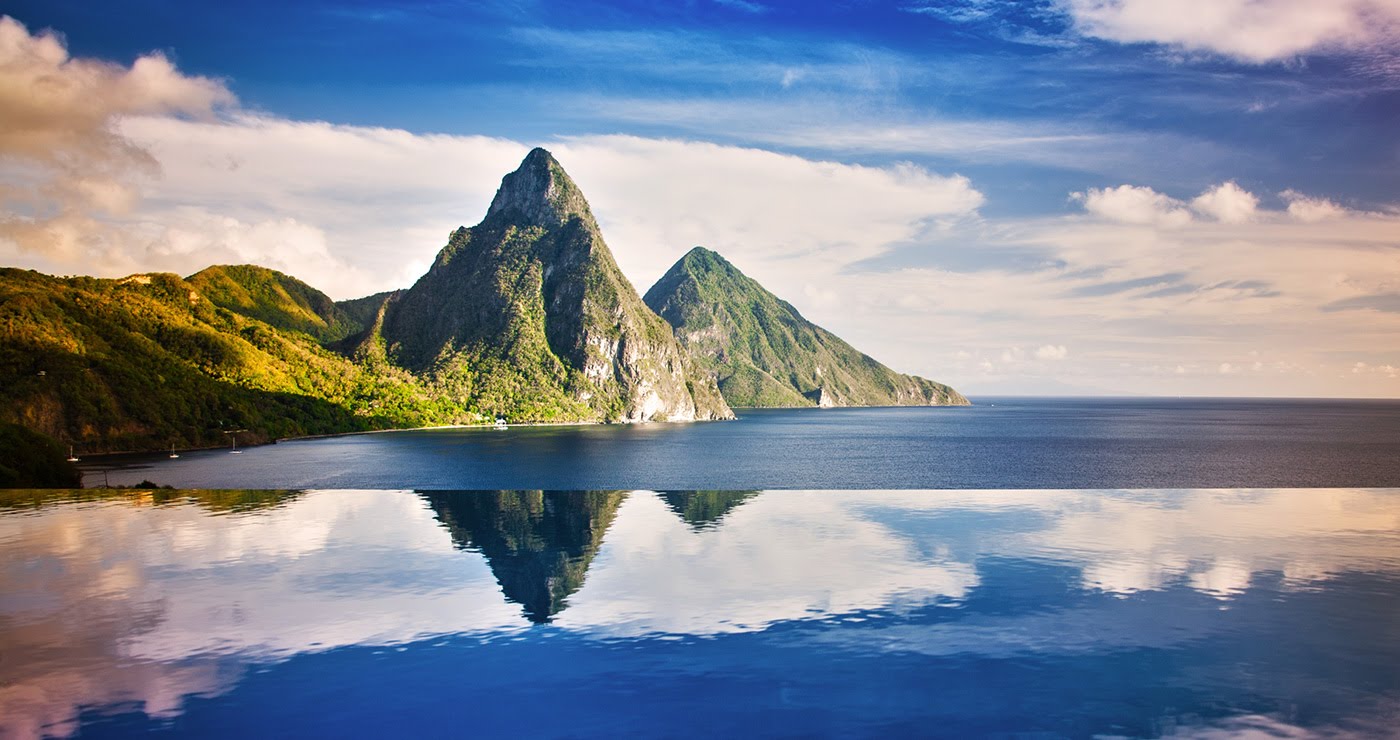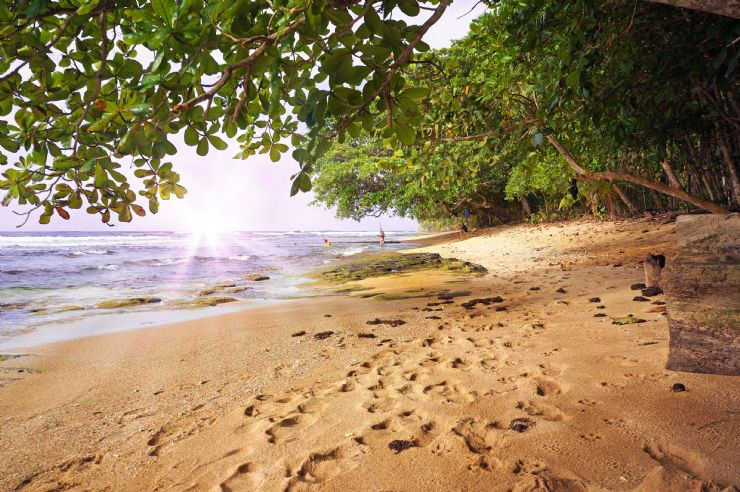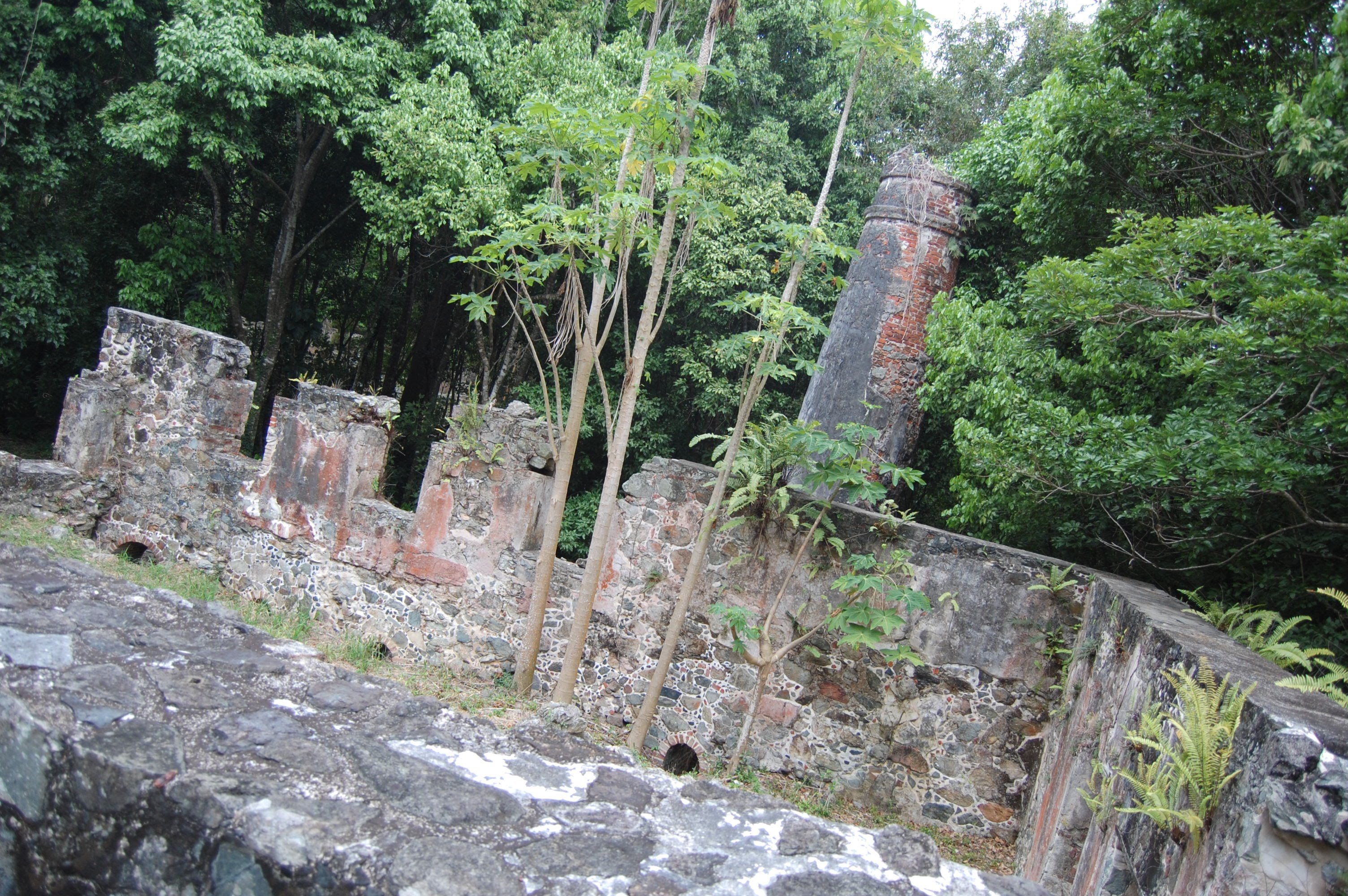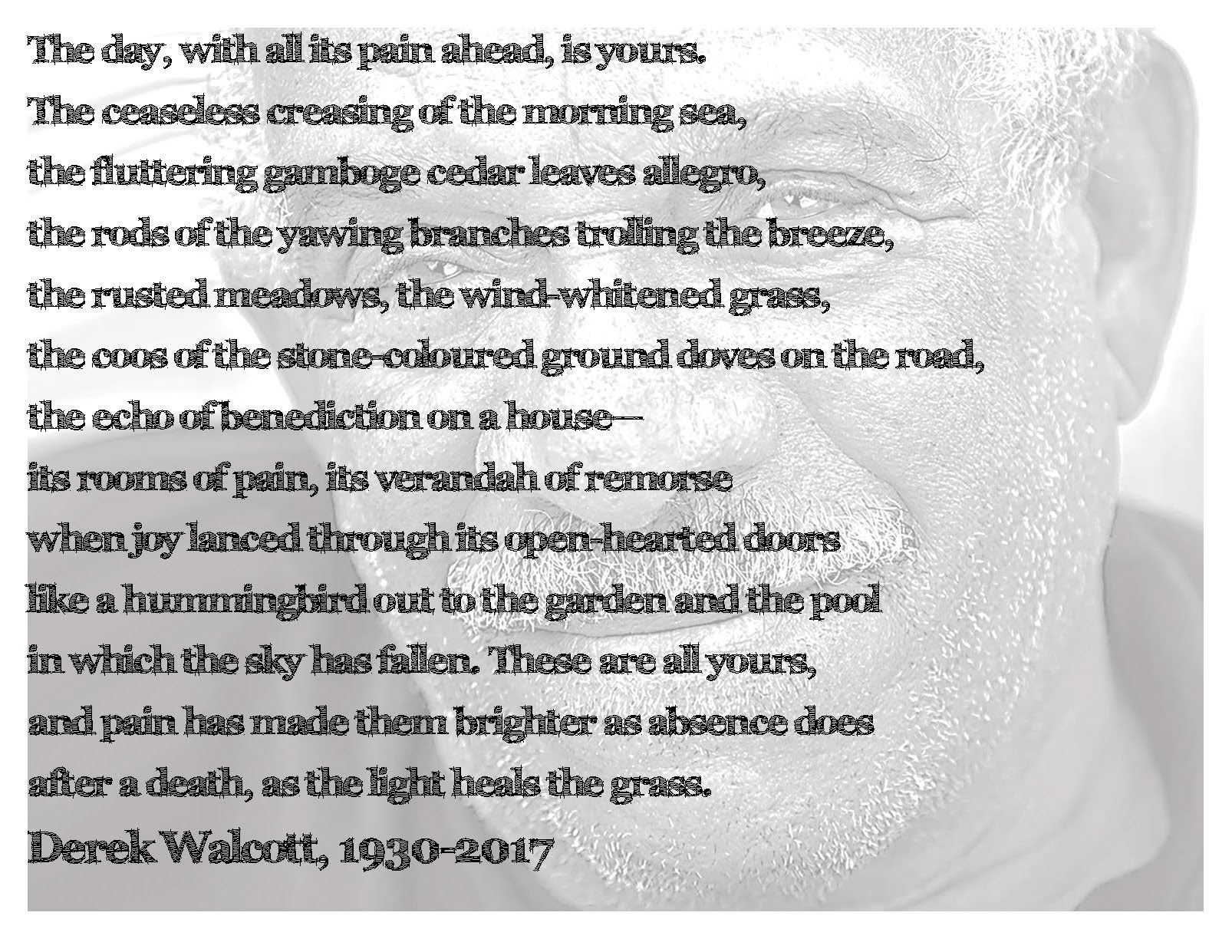Derek Walcott - Four Poems

As John to Patmos
His heart to peace, as here surrounded
By the strewn-silver on waves, the wood’s crude hair, the rounded
Breasts of the milky bays, palms flocks, the green and dead
Leaves, the sun’s brass coin on my cheek, where
Canoes brace the sun’s strength, as John, in that bleak air,
So am I welcomed richer by these blue scapes, Greek there,
So I shall voyage no more from home; may I speak here.
This island is heaven – away from the dustblown blood of cities;
See the curve of bay, watch the straggling flower, pretty is
The wing’d sound of trees, the sparse-powdered sky, when lit is
The night. For beauty has surrounded
Its black children, and freed them of homeless ditties.
As John to Patmos, in each love-leaping air,
O slave, soldier, worker under red trees sleeping, hear
What I swear now, as John did:
To praise lovelong, the living and the brown dead. 1947

The Almond Trees
this early;
cold sand
cold churning ocean, the Atlantic,
no visible history,
except this stand
of twisted, coppery, sea-almond trees
their shining postures surely
bent as metal, and one
foam-haired, salt-grizzled fisherman,
his mongrel growling, whirling on the stick
he pitches him; its spinning rays
'no visible history'
until their lengthened shapes amaze the sun.
By noon,
this further shore of Africa is strewn
with the forked limbs of girls toasting their flesh
in scarves, sunglasses, Pompeian bikinis,
brown daphnes, laurels, they'll all have
like their originals, their sacred grove,
this frieze
of twisted, coppery, sea-almond trees.
The fierce acetylene air
has singed
their writing trunks with rust, the same
hues as a foundered, peeling barge.
It'll sear a pale skin copper with its flame.
The sand's white-hot ash underheel,
but their aged limbs have got their brazen sheen
from fire. Their bodies fiercely shine!
They're cured,
they endured their furnace.
Aged trees and oiled limbs share a common color!
Welded in one flame,
huddled naked, stripped of their name,
for Greek or Roman tags, they were lashed
raw by wind, washed
out with salt and fire-dried,
bitterly nourished where their branches died,
their leaves' broad dialect a coarse,
enduring sound
they shared together.
Not as some runing hamadryad's cries
rooted, broke slowly into leaf
her nipples peaking to smooth, wooden boles.
Their grief
howls seaward through charred, ravaged holes.
One sunburnt body now acknowledges
that past and its own metamorphosis
as, moving from the sun, she kneels to spread
her wrap within the beat arms of this grove
that grieves in silence, like parental love. 1965

The Sea Is History
Where is your tribal memory? Sirs,
in that grey vault. The sea. The sea
has locked them up. The sea is History.
First, there was the heaving oil,
heavy as chaos;
then, like a light at the end of a tunnel,
the lantern of a caravel,
and that was Genesis.
Then there were the packed cries,
the shit, the moaning:
Exodus.
Bone soldered by coral to bone,
mosaics
mantled by the benediction of the shark’s shadow,
that was the Ark of the Covenant.
Then came from the plucked wires
of sunlight on the sea floor
the plangent harps of the Babylonian bondage,
as the white cowries clustered like manacles
on the drowned women,
and those were the ivory bracelets
of the Song of Solomon,
but the ocean kept turning blank pages
looking for History.
Then came the men with eyes heavy as anchors
who sank without tombs,
brigands who barbecued cattle,
leaving their charred ribs like palm leaves on the shore,
then the foaming, rabid maw
of the tidal wave swallowing Port Royal,
and that was Jonah,
but where is your Renaissance?
Sir, it is locked in them sea-sands
out there past the reef’s moiling shelf,
where the men-o’-war floated down;
strop on these goggles, I’ll guide you there myself.
It’s all subtle and submarine,
through colonnades of coral,
past the gothic windows of sea-fans
to where the crusty grouper, onyx-eyed,
blinks, weighted by its jewels, like a bald queen;
and these groined caves with barnacles
pitted like stone
are our cathedrals,
and the furnace before the hurricanes:
Gomorrah. Bones ground by windmills
into marl and cornmeal,
and that was Lamentations—
that was just Lamentations,
it was not History;
then came, like scum on the river’s drying lip,
the brown reeds of villages
mantling and congealing into towns,
and at evening, the midges’ choirs,
and above them, the spires
lancing the side of God
as His son set, and that was the New Testament.
Then came the white sisters clapping
to the waves’ progress,
and that was Emancipation—
jubilation, O jubilation—
vanishing swiftly
as the sea’s lace dries in the sun,
but that was not History,
that was only faith,
and then each rock broke into its own nation;
then came the synod of flies,
then came the secretarial heron,
then came the bullfrog bellowing for a vote,
fireflies with bright ideas
and bats like jetting ambassadors
and the mantis, like khaki police,
and the furred caterpillars of judges
examining each case closely,
and then in the dark ears of ferns
and in the salt chuckle of rocks
with their sea pools, there was the sound
like a rumour without any echo
of History, really beginning. 1979

Ruins of a Great House
though our longest sun sets at right declensions and
makes but winter arches, it cannot be long before we
lie down in darkness, and have our light in ashes . . .
—Browne, Urn Burial
Whose moth-like girls are mixed with candledust,
Remain to file the lizard's dragonish claws.
The mouths of those gate cherubs shriek with stain;
Axle and coach wheel silted under the muck
Of cattle droppings.
Three crows flap for the trees
And settle, creaking the eucalyptus boughs.
A smell of dead limes quickens in the nose
The leprosy of empire.
"Farewell, green fields,
Farewell, ye happy groves!"
Marble like Greece, like Faulkner's South in stone,
Deciduous beauty prospered and is gone,
But where the lawn breaks in a rash of trees
A spade below dead leaves will ring the bone
Of some dead animal or human thing
Fallen from evil days, from evil times.
It seems that the original crops were limes
Grown in that silt that clogs the river's skirt;
The imperious rakes are gone, their bright girls gone,
The river flows, obliterating hurt.
I climbed a wall with the grille ironwork
Of exiled craftsmen protecting that great house
From guilt, perhaps, but not from the worm's rent
Nor from the padded cavalry of the mouse.
And when a wind shook in the limes I heard
What Kipling heard, the death of a great empire, the abuse
Of ignorance by Bible and by sword.
A green lawn, broken by low walls of stone,
Dipped to the rivulet, and pacing, I thought next
Of men like Hawkins, Walter Raleigh, Drake,
Ancestral murderers and poets, more perplexed
In memory now by every ulcerous crime.
The world's green age then was rotting lime
Whose stench became the charnel galleon's text.
The rot remains with us, the men are gone.
But, as dead ash is lifted in a wind
That fans the blackening ember of the mind,
My eyes burned from the ashen prose of Donne.
Ablaze with rage I thought,
Some slave is rotting in this manorial lake,
But still the coal of my compassion fought
That Albion too was once
A colony like ours, "part of the continent, piece of the main,"
Nook-shotten, rook o'erblown, deranged
By foaming channels and the vain expense
Of bitter faction.
All in compassion ends
So differently from what the heart arranged:
"as well as if a manor of thy friend's. . . " 1956
